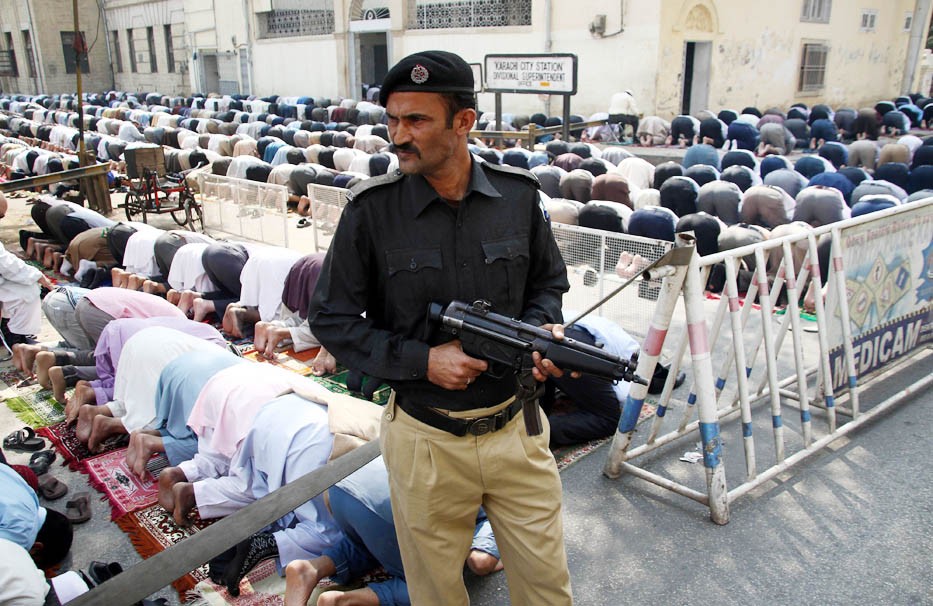
Until we unravel the actual causes of violence in the name of Islam, any counter-narrative is doomed to failure

A host of sectarian, militant and terrorist outfits, coming from Pakistan’s diverse intra-religious milieu, justify their employment of violence in the name of Islam. Any counter-narrative, long overdue, will not efficiently serve the function until it does not take into account those factors that begot the narrative.
This article contends that violence in the name of religion is the end product of some concrete factors in the recent past.
First, the narrative in its milder form can be traced back to the politics of the pre-partition era. All India Muslim League, a communal party that spearheaded Pakistan movement, employed religion in the service of politics. In opposition to Congress’s one nation theory, Muslim League propagated that two major and separate nations, Hindus and Muslims, lived in India.
League’s leaders, Jinnah being the most eminent, believed that Muslims and Hindus hailed from two diametrically opposed socio-religious systems; Muslims’ interests in India, in the face of Hindu majority in a democratic milieu, could only be secured through a separate status for the community. Nowhere was the idea of the distinct community more forcefully expressed than in the Lahore Resolution: "…areas in which the Muslims are numerically in a majority as in the North Western and Eastern Zones of (British) India should be grouped to constitute ‘independent states’ in which the constituent units should be autonomous and sovereign."
Convinced that Pakistan was achieved in the name of Islam, clerics of all hues, despite their vehement opposition to the very idea of Pakistan, unanimously believe that the only remedy to Pakistan’s multifarious woes lies in introducing an Islamic system in the country. A coterie of extremist clerics, especially of the Deobandi persuasion, have been manipulative enough to persuade the gullible public that ‘western stooges’ have been ruling Pakistan since its inception and only bullets not ballots can bring about Shariah regime in the country.
Right from the passing of Objectives Resolution on March 12, 1949, providing religious underpinnings to the future constitution making to anti-Ahmadi riots in 1954 to the eventual declaration of Ahmadis as non-Muslim minority on September 7, 1974, religion has had a deterministic influence on the constitutional history of Pakistan.
Secondly, as a result of the Soviet-American rivalry in Afghanistan, the Iranian revolution and the concomitant Tehran-Riyadh proxy war in Pakistan and Gen Ziaul Haq’s 11-year rule of the country, the militarisation and radicalisation along religious and sectarian lines of Pakistan in general and its Pashtun populated north-west in particular was perfected.
The Soviet Union’s military intervention in Afghanistan on December 27, 1979, to prop up a fledgling communist regime there that had seized power in a coup d’état called Saur revolution on April 27, 1978, relocated American interest to that country to contain the erstwhile Soviet Union’s southward expansion in the world’s largest covert war in the name of Islam, engineered in the Pashtun populated north-west Pakistan. Most of the Soviet Union’s $45 billion to defeat Mujahideen while the US, Saudi Arabia and other countries’ $10 billion aid to the rebels was in form of deadly weaponry.
Based in Peshawar, seven resistance parties recruited Afghan refugees from 104 Refugees Tented Villages located mainly in Bajaur, Kurram and North Waziristan agencies. Similarly, Osama’s al Qaeda, that in all probability introduced suicide attacks in Pakistan, was the successor of Abdullah Azam’s Makhtab-al-Khidmat. Founded in 1984, MAK channeled Saudi funds and donation from other Muslim countries to Mujahideen. Laden first came to Peshawar in 1980 only to settle there in 1982 and took over MAK after Azam’s assassination in Peshawar in 1989 and established al Qaeda.
The launch of Islamic revolution in Iran on February 11, 1979 transformed Pakistani Shia community from apolitical to political with the shift of power and influence from Najaf-educated apolitical "old Shia" to Qom-educated political "new Shia", denounced as the "Wahabi Shia" by the former. The Tehreek Nifaz-e-Fiqa Jafria (TNFJ) -- later renamed as Tehreek-e-Jafria Pakistan in 1993 -- that spearheaded Shiite religious and political activism in Pakistan, was created in Bhakkar in 1979. On the other hand, during Zia’s dictatorial rule, instituting Islam of the Sunni persuasion while causing deep apprehensions among Pakistani assertive Shia minority, Sipah-e-Sahaba Pakistan (SSP) was founded in 1985 to counter growing Shia activism in the country.
With a fierce competition for power and influence between Saudi Arabia and Iran underway, the sectarian landscape became messier with the formation of the two militant outfits of Deobandi Lashkar-e-Jhangvi and the Istha-e-Ashari Sipah-e-Mohammad in 1994.
According to Mariam Abou Zahab, a researcher and the author of Islamist Networks, almost all leaders of LeJ had fought in Afghanistan. By 2002, according to Zahab, 10,000 Pakistanis had received military training in Afghanistan after the withdrawal of Soviets from the country for jihad in Kashmir and Afghanistan. In 1990, Lashkar-e-Taiba (Let), the militant wing of Markaz al Dawat-ul-Irshad (JuD), established a camp in Kunar Afghanistan that imparted religious and military training. The Jamaat, based in Muridke, near Lahore since 1987, was established in the 1980s.
The Taliban, who emerged on the Afghan political spectrum, were largely the veterans of Afghan jihad. They also recruited mainly from Pakistani Deobandi madrassas and the tribal areas. Post 9/11 Pakistan became a relocated battlefield for Taliban militants as many of them felt betrayed after Pakistan became frontline state in the US’s bid to topple the Taliban regime. The Tehreek-e-Taliban Pakistan (TTP), a conglomerate of dozens of militant groups formed in December 2007, sanctify their violence in the name of Islam.
Until we unravel the actual causes of violence in the name of Islam, any counter-narrative is doomed to failure.